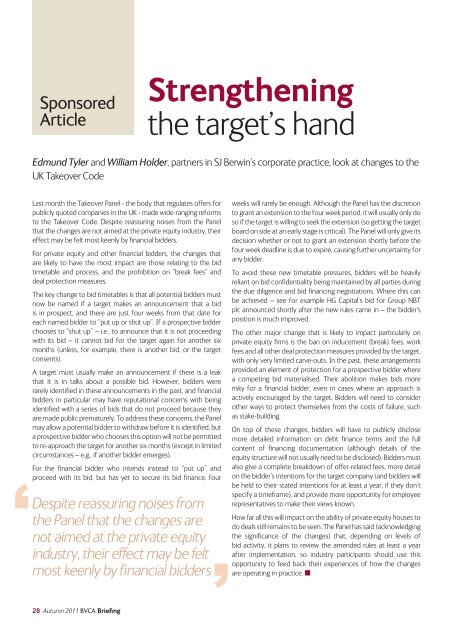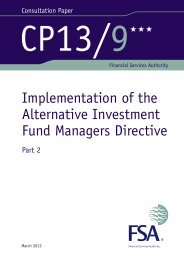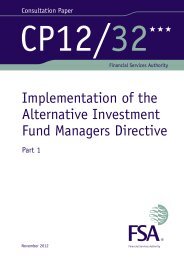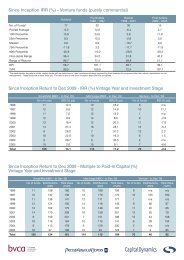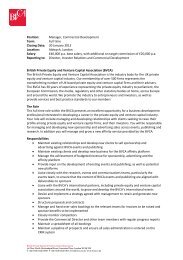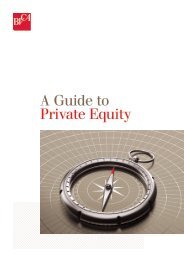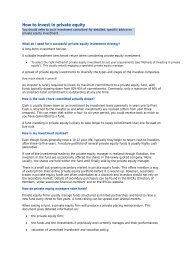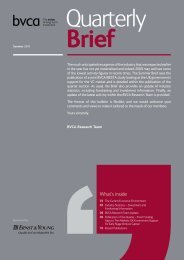You also want an ePaper? Increase the reach of your titles
YUMPU automatically turns print PDFs into web optimized ePapers that Google loves.
Sponsored<br />
Article<br />
edmund Tyler and William Holder, partners in SJ Berwin’s corporate practice, look at changes to the<br />
UK Takeover Code<br />
Last month the Takeover Panel - the body that regulates offers for<br />
publicly quoted companies in the UK - made wide-ranging reforms<br />
to the Takeover Code. Despite reassuring noises from the Panel<br />
that the changes are not aimed at the private equity industry, their<br />
effect may be felt most keenly by financial bidders.<br />
For private equity and other financial bidders, the changes that<br />
are likely to have the most impact are those relating to the bid<br />
timetable and process, and the prohibition on “break fees” and<br />
deal protection measures.<br />
The key change to bid timetables is that all potential bidders must<br />
now be named if a target makes an announcement that a bid<br />
is in prospect, and there are just four weeks from that date for<br />
each named bidder to “put up or shut up”. If a prospective bidder<br />
chooses to “shut up” – i.e., to announce that it is not proceeding<br />
with its bid – it cannot bid for the target again for another six<br />
months (unless, for example, there is another bid, or the target<br />
consents).<br />
A target must usually make an announcement if there is a leak<br />
that it is in talks about a possible bid. However, bidders were<br />
rarely identified in these announcements in the past, and financial<br />
bidders in particular may have reputational concerns with being<br />
identified with a series of bids that do not proceed because they<br />
are made public prematurely. To address these concerns, the Panel<br />
may allow a potential bidder to withdraw before it is identified, but<br />
a prospective bidder who chooses this option will not be permitted<br />
to re-approach the target for another six months (except in limited<br />
circumstances – e.g., if another bidder emerges).<br />
For the financial bidder who intends instead to “put up” and<br />
proceed with its bid, but has yet to secure its bid finance, four<br />
Despite reassuring noises from<br />
the Panel that the changes are<br />
not aimed at the private equity<br />
industry, their effect may be felt<br />
most keenly by financial bidders<br />
28 Autumn 2011 <strong>BVCA</strong> <strong>Briefing</strong><br />
Strengthening<br />
the target’s hand<br />
weeks will rarely be enough. Although the Panel has the discretion<br />
to grant an extension to the four week period, it will usually only do<br />
so if the target is willing to seek the extension (so getting the target<br />
board on side at an early stage is critical). The Panel will only give its<br />
decision whether or not to grant an extension shortly before the<br />
four week deadline is due to expire, causing further uncertainty for<br />
any bidder.<br />
To avoid these new timetable pressures, bidders will be heavily<br />
reliant on bid confidentiality being maintained by all parties during<br />
the due diligence and bid financing negotiations. Where this can<br />
be achieved – see for example HG Capital’s bid for Group NBT<br />
plc announced shortly after the new rules came in – the bidder’s<br />
position is much improved.<br />
The other major change that is likely to impact particularly on<br />
private equity firms is the ban on inducement (break) fees, work<br />
fees and all other deal protection measures provided by the target,<br />
with only very limited carve-outs. In the past, these arrangements<br />
provided an element of protection for a prospective bidder where<br />
a competing bid materialised. Their abolition makes bids more<br />
risky for a financial bidder, even in cases where an approach is<br />
actively encouraged by the target. Bidders will need to consider<br />
other ways to protect themselves from the costs of failure, such<br />
as stake-building.<br />
On top of these changes, bidders will have to publicly disclose<br />
more detailed information on debt finance terms and the full<br />
content of financing documentation (although details of the<br />
equity structure will not usually need to be disclosed). Bidders must<br />
also give a complete breakdown of offer-related fees, more detail<br />
on the bidder’s intentions for the target company (and bidders will<br />
be held to their stated intentions for at least a year, if they don’t<br />
specify a timeframe), and provide more opportunity for employee<br />
representatives to make their views known.<br />
How far all this will impact on the ability of private equity houses to<br />
do deals still remains to be seen. The Panel has said (acknowledging<br />
the significance of the changes) that, depending on levels of<br />
bid activity, it plans to review the amended rules at least a year<br />
after implementation, so industry participants should use this<br />
opportunity to feed back their experiences of how the changes<br />
are operating in practice. n


